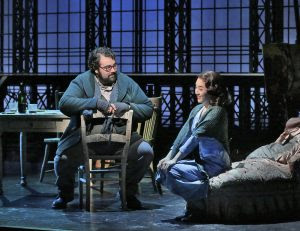Opera Theatre of Saint Louis: A youthful, friendship-intense 'La Boheme' nears the end of its run
Everything you most want from a "La Boheme" (in addition to good singing) has to do with how well the bonds of friendship and love among impecunious young urbanites with artistic inclinations are conveyed. There are probably more people who fit that description now than in 1896, when Puccini's fourth opera first made its glorious way in the world. But that doesn't ensure this heady blend of camaraderie and commitment will come across on the opera stage, despite the music's imperishable assistance.
 |
| Rodolfo and Mimi get acquainted in the bohemians' attic apartment. |
Opera Theatre of Saint Louis' fifth "Boheme" production in its 41-year history, with just two more mainstage performances remaining, strikes home. The young Bohemians scrape by with consistent grace and good humor, streaked with romantic melancholy. The production's updating to about 1930 hardly affects the sentimental charm of the setting. (It's not a thoroughgoing updating, in any case: at least for his journalism, Rodolfo would be using a clattery old typewriter, wouldn't he?)
Already by the time Puccini and his librettists spun gold from the material, the popular novel on which they based the opera had become a period piece. The worldly vanities of the 1840s and the 1890s presumably remained roughly the same in this production's era; at least they allow for a chic streamlining of costume design to give new panache to the Latin Quarter scene.
The four Bohemians sharing an attic apartment, struggling to stay warm, decently fed, and inspired, displayed a convincing rapport from the start. Particular credit for that goes to Anthony Clark Evans as Marcello, the painter, who presented a restless vitality that it took Andrew Haji, as Rodolfo, the poet, a few minutes to catch up to.
 |
| Musetta (Lauren Michelle) tries to reawaken Marcello's interest in her. |
In any event, there was a buoyancy complementing Evans' in the portrayals of the musician Schaunard by Sean Michael Plum and the philosopher Colline by Bradley Smoak. Young and vigorous of wit and bound by true friendship's sturdy hoops of steel, the foursome really clicks. This production is happy in its "Brohemians."
Haji falls into the tradition of stout Rodolfos (Caruso, Tucker and the potbellied Aureliano Pertile among them) that play with our notions of the "starving artist," but as a lover eventually navigating pangs of ardor, jealousy, and eventual grief, he made a credible impression. He sang the part with steady aplomb and well-focused passion, admirably free of flamboyance. (Having seen Richard Tucker in the touring Met production flip off a heckler in Detroit 50 years ago at the end of "Che gelida manina" made me forever extra-sensitive to egocentric Rodolfos.)
The slenderness and expressive radiance of Hae Ji Chang as Mimi were perfect for the role. There were flashes of real modesty in her vocal timbre, yet she put polish on her high notes and matched Haji in those soaring duet passages that melt everyone's heart. Her performance properly cast doubt on Rodolfo's fits of accusation as the story proceeds, and it helped ensure that Mimi's returning to the attic apartment to die would feel like the fitting end to the love affair that Puccini's music ennobles.
The English translation by Richard Pearlman and Francis Rizzo bounced, sat comfortably within the musical phrases, rhymed well and made sense of pathos and humor alike. It was fully up to the lively and imaginative staging by Ron Daniels, who linked the scene-change pauses between the conjoined acts in each half with amusing business involving Chaplinesque busker-beggars on roller skates. Especially well-managed was the Bohemians' teasing and dismissal of the landlord Benoit. They are eager to hoard their cash in order to enjoy Schaunard's proposed night on the town; the rent money must be retained for Yuletide pleasure. This scene is easy to overact, but here the humor was pointed, slyly graceful, unexaggerated.
 |
| The 'Brohemians" give landlord Benoit the runaround. |
The vendors and the children, the strollers, people-watchers, and partiers were portrayed beyond sketchiness. The scene included a brass band parading along an aisle across the theater just before the Café Momus ruckus reaches a climax and Musetta's superannuated lover Alcindoro is stuck with everybody's bill. (I would have liked to see Thomas Hammons in the curtain call to receive plaudits for his excellent work as both Benoit and Alcindoro.)
Lauren Michelle's Musetta is the cynosure of all eyes from the moment of her entrance in that act. The character's control of men's affections, comically elaborated, got a little extra flair in Michelle's performance. Her peals of laughter complemented the flutelike gleam of her singing. Flirtatiousness of gesture, carriage, and voice together made Musetta's winning over of her resentful lover Marcello thoroughly convincing. That Musetta ever thinks of anyone besides herself is hard to square with her sympathy for the dying Mimi in the last act. But Michelle went far in making the subdued, compassionate Musetta as credible as the outrageous flirt of the Cafe Momus.
Emanuele Andrizzi conducted with particular attention to the score's more delicate moments -- its pauses, changes of expressive direction, and the multiple nuances the orchestra supplies to underline or paraphrase the emotional ups and downs of these perennially engaging characters. Once again, they seem to represent both real life and young love's castles in the air, without evident contradiction.
[Photos by Ken Howard]



Comments
Post a Comment